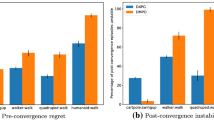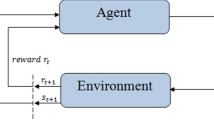Abstract
Reward-based scheduling has been investigated for flexible applications in which an approximate but timely result is acceptable. Meanwhile, significant research efforts have been made on voltage scheduling which exploits the tradeoff between the processor speed and the energy consumption. In this paper, we address the combined scheduling problem of maximizing the total reward of hard real-time systems with a given energy budget. We present an optimal off-line algorithm and an efficient on-line algorithm for jobs with their own release-times/deadlines under Earliest-Deadline-First (EDF) scheduling. Experimental results show that the solution computed by the on-line algorithm is no more than 14% worse than the theoretical optimal solution obtained by the optimal off-line algorithm.
Similar content being viewed by others
References
Aydin, H., R. Melhem, D. Mossé, and P.M. Alvarez. Dynamic and Aggressive Scheduling Techniques for Power-Aware Real-Time Systems. In Proc. of Real-Time Systems Symposium, 2001.
Aydin, H., R. Melhem, D. Mossé, and P.M. Alvarez. Optimal Reward-Based Scheduling for Periodic Real-Time Tasks. IEEE Transactions on Computers, 50(2),111–130, 2001.
Ben-Tal, A. and A. Nemirovski. Lectures on Modern Convex Optimization: Analysis, Algorithms, and Engineering Applications. SIAM, 2001.
Chung, J.-Y., J.W.-S. Liu, and K.-J. Lin. Scheduling Periodic Jobs that Allow Imprecise Results. IEEE Transactions on Computers, 39(9),1156–1173, 1990.
Dey, J.K., J. Kurose, and D. Towsley. On-Line Scheduling Policies for a Class of IRIS (Increasing Reward with Increasing Service) Real-Time Tasks. IEEE Transactions on Computers, 45(7),802–813, 1996.
Gruian, F. Hard Real-Time Scheduling for Low-Energy Using Stochastic Data and DVS Processors. In Proc. of International Symposium on Low Power Electronics and Design, pp. 46–51, 2001.
Hong, I., G. Qu, M. Potkonjak, and M.B. Srivastava. Synthesis Techniques for Low-Power Hard Real-Time Systems on Variable Voltage Processors. In Proc. of Real-Time Systems Symposium, pp. 178–187, 1998.
Kim, W., J. Kim, and S.L. Min. A Dynamic Voltage Scaling Algorithm for Dynamic-Priority Hard Real-Time Systems Using Slack Time Analysis. In Proc. of Design, Automation and Test in Europe, 2002.
Kim, W., J. Kim, and S.L. Min. Dynamic Voltage Scaling Algorithm for Fixed-Priority Real-Time Systems Using Work-Demand Analysis. In Proc. of International Symposium On Low Power Electronics and Design, 2003.
Kim, W., D. Shin, H.-S. Yun, J. Kim, and S.L. Min. Performance Comparison of Dynamic Voltage Scaling Algorithms for Hard Real-Time Systems. In Proc. of Real-Time and Embedded Technology and Applications Symposium, 2002.
Kwon, W.-C. and T. Kim. Optimal Voltage Allocation Techniques for Dynamically Variable Voltage Processors. In Proc. of Design Automation Conference, pp. 125–130, 2003.
Lin, K.-J., S. Natarajan, and J.W.-S. Liu. Imprecise Results: Utilizing Partial Computations in Real-Time Systems. In Proc. of Real-Time Systems Symposium, pp. 210–217, 1987.
Liu, W.-S. Real-Time Systems. Prentice Hall, 2000.
Pillai, P. and K.G. Shin. Real-Time Dynamic Voltage Scaling for Low-Power Embedded Operating Systems. In Proc. of ACM Symposium on Operating Systems Principles, 2001.
Rusu, C., R. Melhem, and D. Mossé. Maximizing the System Value While Satisfying Time and Energy Constraints. In Proc. of Real-Time Systems Symposium, pp. 246–255, 2002.
Rusu, C., R. Melhem, and D. Mossé. Maximizing Rewards for Real-Time Applications with Energy Constraints. ACM Transactions on Embedded Computing Systems, 2(4), 537–559, 2003.
Sakurai, T. and A. Newton. Alpha-power Law MOSFET Model and Its Application to CMOS Inverter Delay and Other Formulars. IEEE Journal of Solid State Circuits, 25(2), 584–594, 1990.
Shih, W.-K., J.W.-S. Liu, and J.-Y. Chung. Algorithms for Scheduling Imprecise Computations with Timing Constraints. SIAM Journal on Computing, 20(3), 537–552, 1991.
Shin, Y. and K. Choi. Power Conscious Fixed Priority Scheduling for Hard Real-Time Systems. In Proc. of Design Automatioin Conference, pp. 134–139, 1999.
Yao, F., A. Demers, and S. Shenker. A Scheduling Model for Reduced CPU Energy. In Proc. of IEEE Annual Foundations of Computer Science, pp. 374–382, 1995.
Yun, H.-S. and J. Kim. Reward-Based Voltage Scheduling for Dynamic-Priority Hard Real-Time Systems. Technical report. Available at http://davinci.snu.ac.kr/Download/daem_techrep.pdf.
Yun, H.-S. and J. Kim. On Energy-Optimal Voltage Scheduling for Fixed-Priority Hard Real-Time Systems. ACM Transactions on Embedded Computing Systems, 2(3), 393–430, 2003.
Author information
Authors and Affiliations
Corresponding author
Rights and permissions
About this article
Cite this article
Yun, HS., Kim, J. Reward-based voltage scheduling for dynamic-priority hard real-time systems. Des Autom Embed Syst 11, 25–48 (2007). https://doi.org/10.1007/s10617-006-9724-2
Issue Date:
DOI: https://doi.org/10.1007/s10617-006-9724-2




